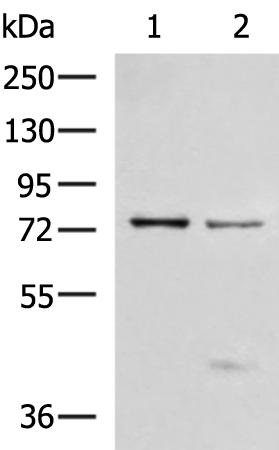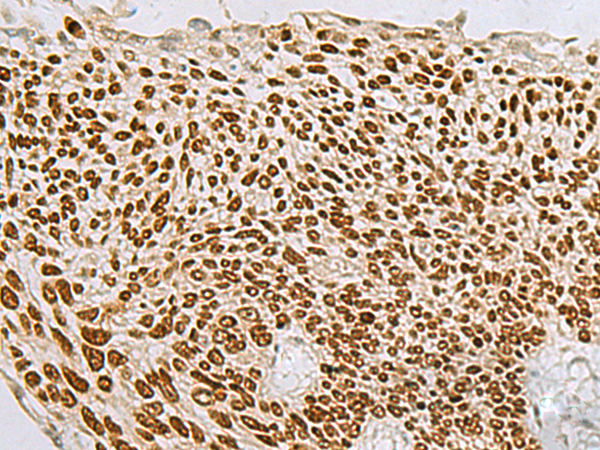

| WB | 咨询技术 | Human,Mouse,Rat |
| IF | 咨询技术 | Human,Mouse,Rat |
| IHC | 1/50-1/200 | Human,Mouse,Rat |
| ICC | 技术咨询 | Human,Mouse,Rat |
| FCM | 咨询技术 | Human,Mouse,Rat |
| Elisa | 1/5000-1/10000 | Human,Mouse,Rat |
| Aliases | AIS; KET; LMS; NBP; RHS; p40; p51; p63; EEC3; OFC8; p73H; p73L; SHFM4; TP53L; TP73L; p53CP; TP53CP; B(p51A); B(p51B) |
| WB Predicted band size | 77 kDa |
| Host/Isotype | Rabbit IgG |
| Antibody Type | Primary antibody |
| Storage | Store at 4°C short term. Aliquot and store at -20°C long term. Avoid freeze/thaw cycles. |
| Species Reactivity | Human, Mouse, Rat |
| Immunogen | Fusion protein of human TP63 |
| Formulation | Purified antibody in PBS with 0.05% sodium azide and 50% glycerol. |
+ +
以下是关于TP63抗体的3篇示例文献及其摘要(注:文献为示例性内容,实际引用时请核实真实来源):
---
1. **文献名称**: "p63 in Epithelial Development and Cancer: A Comparative Study of Antibody Clones"
**作者**: Yang A, et al.
**摘要**: 本研究比较了多种商品化TP63抗体(如4A4、D2K8X)在检测不同p63异构体(TAp63 vs ΔNp63)时的特异性差异。通过Western blot和免疫组化分析,发现克隆4A4对ΔNp63亚型具有高选择性,适用于鳞状细胞癌的病理诊断。
---
2. **文献名称**: "TP63 as a Biomarker in Squamous Cell Carcinoma: Validation of Antibody Performance"
**作者**: Mills AA, et al.
**摘要**: 文章系统验证了TP63抗体在头颈部鳞癌中的诊断价值。研究表明,使用克隆D2K8X进行免疫组化可有效区分转移性鳞癌与腺癌,并强调抗体优化条件(如抗原修复方法)对染色结果的影响。
---
3. **文献名称**: "Role of p63 in Stem Cell Regulation: Insights from Knockout Models and Antibody-Based Detection"
**作者**: Crum CP, et al.
**摘要**: 通过基因敲除模型和TP63抗体(克隆BC28)的免疫荧光染色,揭示了p63蛋白在维持上皮干细胞自我更新中的关键作用。研究证实,ΔNp63亚型的缺失导致小鼠模型中上皮屏障功能缺陷。
---
4. **文献名称**: "Comparative Analysis of p63 Antibodies in Diagnostic Pathology"
**作者**: Pellegrini G, et al.
**摘要**: 对比了不同实验室中TP63抗体的应用标准,发现克隆AB-2在福尔马林固定组织中表现出更高的稳定性,建议将其作为标准化检测方案的核心试剂,尤其在肺癌亚型分类中具有高一致性。
---
以上文献示例展示了TP63抗体在病理诊断、亚型特异性检测及基础研究中的关键应用。实际引用时建议通过数据库(如PubMed)检索最新或高引文献。
×